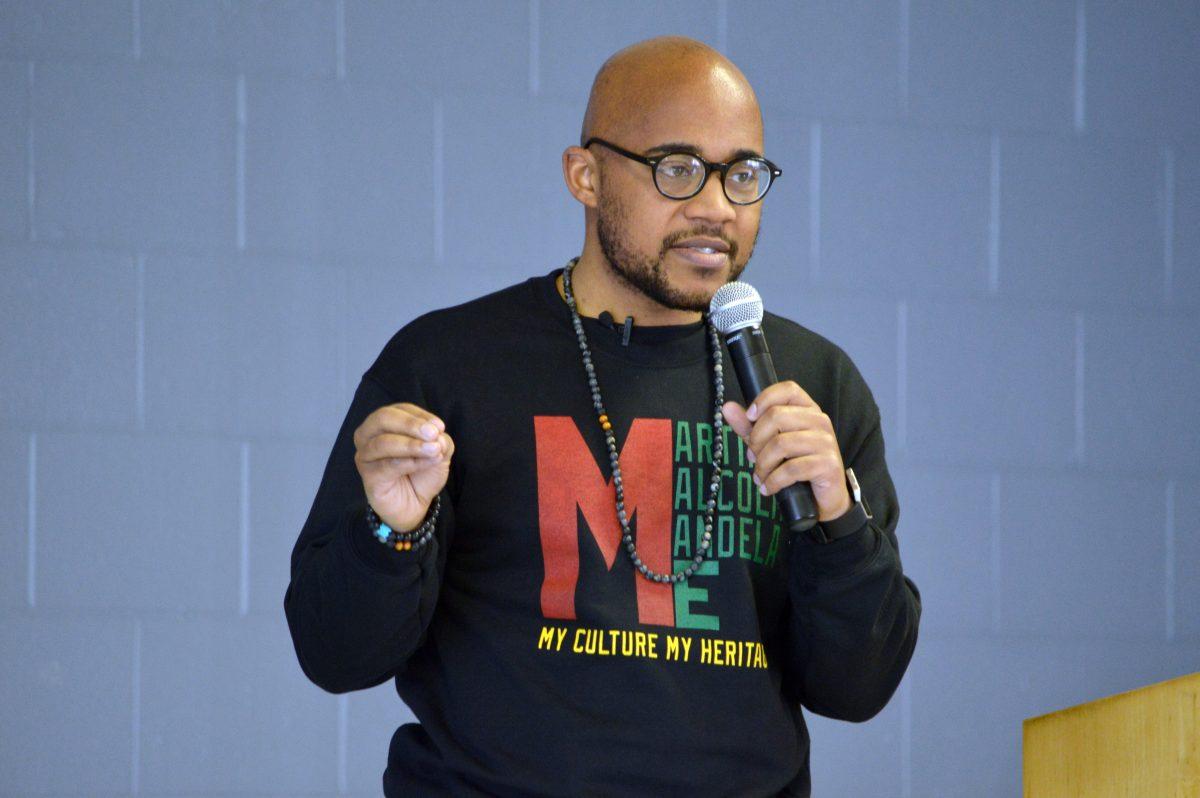 " />
" />
Kaydee Gawlik
Jonathan Butler, a University of Missouri-Columbia graduate and the man behind the Mizzou Hunger Strike, speaks to the crowd in the Sankofa Room in Witherspoon Student Center during TUFF Talks on Monday, April 4, 2016. "The most common way people give up their power, is not knowing that they have any." TUFF Talks, an event sponsored by Black Students Board of Union Activities Board and reminiscent of TED Talks, is a part of the Pan-Afrikan Week 2016. The theme for this year's Pan-Afrikan Week is "Rooted": honoring and affirming the importance of culture and the celebration of community. Butler stated, "If we don't come together, there's no point in fighting because it will fail. If we don't actually try and do something for our future, we're ensuring our demise."
Jonathan Butler, a graduate student at the University of Missouri, discussed the importance of student activism at a TUFFtalk on Monday as part of Pan-Afrikan Week 2016. The University of Missouri has recently received national media attention because of Butler’s activist efforts.
Butler’s talk focused on how university students and faculty can be a positive force for change in the fight for racial equality. Butler gave some of his background information and pointed out the difference between what some students consider to be activism and what is actually activism, as he sees it.
Butler described how activism has become “trendy” among college students today. He recounted his undergraduate experience and how he felt like he was being an activist—he joined teams and groups and went to meetings in an effort to be an activist —but it was really just for show. He said there was no substance to what he felt at the time was activism.
Butler said this false activism he was originally so proud of was turned around with the murder of Mike Brown in Ferguson, Missouri. He said that he took the protests in Ferguson as an example of true activism. Butler pointed out the juxtaposition between the people of Ferguson who were not as well-off as he was but gave so much, versus college students who were very fortunate but pretended to be activists in order to feel better about their actions.
“It was the difference between people who had nothing giving their all and people who had it all giving nothing,” he said.
Butler also spoke about how the problems at the University of Missouri are presented in the media as if it was the start of the problem. Butler pointed out that it is important to understand the context of these racial issues and that they are systemic problems that did not begin at the University of Missouri.
Butler referenced a Chronicle article titled “10 ways to not be the next Mizzou.” Butler pointed out that the racial problems he faced at the University of Missouri could be happening at any college in the country.
“If you aren’t actually observing the environment you’re in, Mizzou is probably already happening,” Butler said. “Mizzou can happen anywhere.”
Butler also said it is important for the university staff to help with the students’ desires to face these issues head on.
“Everyone has to come together in order for this fight to work,” he said.
Butler pointed out that when students are forced to take a matter into their own hands, their academics suffer. Butler thinks it is important for the whole community to work together, otherwise the sacrifices of those who have fought for racial equality in the past will be in vain.
Butler wanted it to be clear that anyone could do what he did.
“All I did was stop eating, some people got mad, we protested a little bit, and now I’m here in front of you,” he said. “If you get nothing else from what I tell you today, I want it to be that stories have power.”
Many students and other audience members had questions and showed their appreciation for Butler’s efforts.
“These events are important to bring light to topics to bring diversity to campus and defeat racism,” said Ashley Hall, a sophomore studying biology.
Butler spent a lot of time in church as a child and spoke about how though he learned a lot there, he also saw that even his church community was not absent of injustices. Butler spoke specifically about the negative ways in which the church treated women, members of the LGBT community, and members of other religions. Butler said he learned a lot about humanity as a child in the church.
“My humanity lies in my ability to give humanity to others,” Butler said.